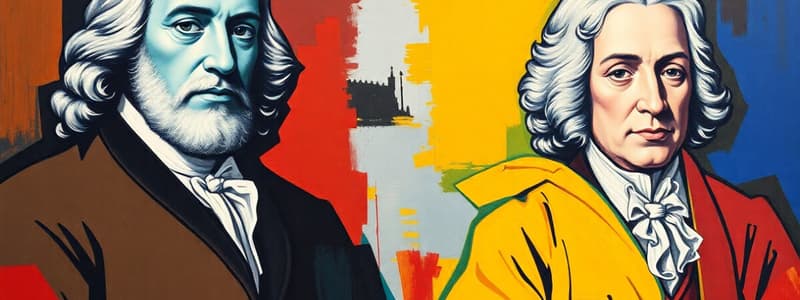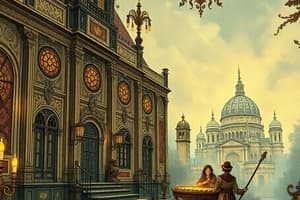Podcast
Questions and Answers
Which political theorist is known for the concept of the 'social contract'?
Which political theorist is known for the concept of the 'social contract'?
- Thomas Hobbes
- John Locke
- Baron de Montesquieu
- Jean-Jacques Rousseau (correct)
The Articles of Confederation effectively established a strong national government.
The Articles of Confederation effectively established a strong national government.
False (B)
What is the main focus of the Virginia Plan in the Constitutional Convention?
What is the main focus of the Virginia Plan in the Constitutional Convention?
The Virginia Plan proposed a bicameral legislature based on population, favoring larger states.
The _____ powers are those specifically listed in the Constitution.
The _____ powers are those specifically listed in the Constitution.
Match each type of grant to its description:
Match each type of grant to its description:
Study Notes
Thomas Hobbes
- Argued for a strong sovereign to maintain order and security
- Believed that humans are inherently selfish and driven by a desire for power
- His book Leviathan, published in 1651, laid out his political philosophy
- He believed that life in a state of nature would be "solitary, poor, nasty, brutish, and short"
Baron de Montesquieu
- Advocated for the separation of powers
- He proposed a system of checks and balances to prevent tyranny
- His ideas were influential in the development of the United States Constitution
- He argued that a government with three independent branches (executive, legislative, and judicial) would be the most effective in protecting individual liberties
John Locke
- Argued for natural rights, including life, liberty, and property
- He believed that government derives its authority from the consent of the governed
- His writings influenced the Declaration of Independence and the American Revolution
- Believed that individuals have the right to resist tyranny
Jean-Jacques Rousseau
- Emphasized the importance of popular sovereignty
- He argued that government should be based on the general will of the people
- His ideas about the social contract influenced the French Revolution
- He believed that people are naturally good but are corrupted by society
5 Common Functions of Government
- Maintaining order
- Providing public services (e.g., education, healthcare)
- Protecting individual rights
- Promoting economic growth
- Defending the nation from external threats
Traditional Democratic Theory
- Majority rule - Decisions are made by a simple majority vote
- Minority rights- Rights of the minority are protected
- Free and fair elections- Ensure that the will of the people is reflected in government
- Political equality- All citizens have an equal say in the political process
- Limited government- Power of the government is constrained by the Constitution
Contemporary Theories of American Democracy
-
Pluralism
- Power is dispersed among various groups
- Competing interests form alliances to influence policy
- Political decisions are made through compromise and negotiation
-
Elitism
- Power is concentrated in the hands of a small, wealthy elite
- These elites control the political process and make decisions that benefit themselves
- The theory suggests that ordinary citizens have little influence on government
-
Participatory
- Encourages active participation in the political process
- Emphasizes citizen involvement in decision-making
- Examples include community organizing, direct democracy initiatives (referendums and recalls)
Why the Articles of Confederation Failed
- Weak central government- Lacked power to tax and regulate commerce
- Lack of national currency- Hindered trade and economic stability
- No national judiciary- Led to conflicting interpretations of laws
Shay's Rebellion
- Uprising of farmers in Massachusetts protesting high taxes and debt
- Demonstrated the weakness of the Articles of Confederation
- It highlighted the need for a stronger national government
Anti-Federalist and Federalist Agreement
- Both Anti-Federalists and Federalists agreed on the need for a free government
Constitutional Convention
- Took place in Philadelphia in 1787
- Delegates from 12 of the 13 states (Rhode Island did not participate) met to revise the Articles of Confederation
- Ultimately, they scrapped the Articles and drafted a new Constitution
The Outcome of the Constitutional Convention
- The adoption of the United States Constitution
- Established a federal system of government with divided powers
- Established rules and procedures for governing the new nation
The Virginia Plan
- Proposed a strong national government with a bicameral legislature based on population
- Favored larger states with more population
The New Jersey Plan
- Proposed a weaker national government with a unicameral legislature where each state had equal representation
- Favored smaller states
Presidential Veto
- After a President vetoes an act passed by Congress, Congress can override the veto with a two-thirds majority vote in both the House and the Senate
Formally Amending the Constitution
- Proposal
- Two-thirds of both houses of Congress
- A national convention called by Congress at the request of two-thirds of the states
- Ratification
- Three-fourths of the state legislatures
- Ratification by conventions in three-fourths of the states
Federalism
- A system of government where power is divided between a central government and regional governments (like states)
- The 10th Amendment is closely linked to federalism, reserving powers not delegated to the federal government to the states or the people
The Importance of Commerce Power
- The Commerce Clause gives Congress authority to regulate interstate commerce
- Grants Congress significant power to influence the economy and regulate business
- It has been used to justify a wide range of federal laws affecting the economy
Enumerated Powers
- Specific powers granted to the federal government by the Constitution
- Found in Article I, Section 8 of the Constitution
- Examples:
- To declare war
- To regulate commerce
- To coin money
SCOTUS Cases on Enumerated Powers
- McCulloch v Maryland (1819): Established the principle of implied powers, suggesting that the federal government has powers beyond those explicitly listed in the Constitution (like the power to create a national bank)
- US v Lopez (1995): Limited the federal government's commerce power, ruling that Congress could not use it to regulate firearms in schools (The Court determined this was solely under state control).
Block Grants, Project Grants, and Formula Grants
- Block Grants: Federal funds given to states with broad discretion on how to spend the money
- Project Grants: Federal funds given to states or other entities for specific projects, requiring applications and competition for the funds
- Formula Grants: Federal funds given to states based on a formula, such as population or income, to fund programs like Medicaid.
Devolution
- The transfer of power and responsibility from the federal government to state and local governments
- Example: Welfare reform under President Bill Clinton devolved many aspects of the program to the states
SCOTUS Cases
- McCulloch v Maryland (1819): Upheld the supremacy of the federal government over states, establishing the Necessary and Proper Clause and expanding implied powers
- US v Lopez (1995): Limited the federal government's commerce power, suggesting that federal regulation was not appropriate in all cases (In this case, it involved limiting gun control legislation)
- Marbury v Madison (1803): Established the principle of judicial review, empowering the Supreme Court to declare laws unconstitutional
Studying That Suits You
Use AI to generate personalized quizzes and flashcards to suit your learning preferences.
Related Documents
Description
Explore the foundational ideas of political philosophy through the works of Thomas Hobbes, Baron de Montesquieu, and John Locke. This quiz covers their arguments regarding sovereignty, separation of powers, and natural rights. Test your knowledge on how these thinkers influenced modern political systems.




